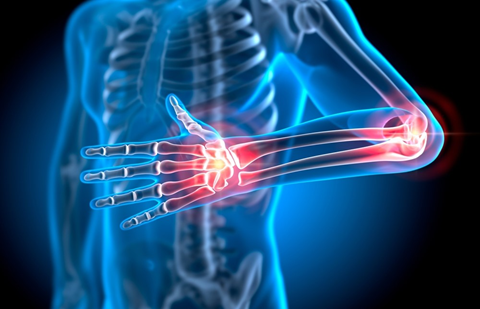- About Ajou
- Admission
- Academics
- Research
-
International
International
- Campus Life
-
News and Event
News and Event
-
AUT
AUT
Major Research Result
NEW Paving the Way Towards Innovative Therapies for Treating Autoimmune Diseases
- 2023-09-20
- 1459
Scientists identify a novel orally active small-molecule tumor necrosis factor inhibitor that suppressed symptoms of inflammatory arthritis in mice
Autoimmune diseases such as rheumatoid arthritis are known to be associated with tumor necrosis factor (TNF), a proinflammatory cytokine. While these conditions are known to have a profound impact on the lives of patients, researchers from Korea have identified a small-molecule called TNF-inhibitory molecule 1 (TIM1), which can inhibit excessive signaling by TNF, lower arthritis-related inflammation, and ultimately improve patients’ quality of life.

Scientists from Korea have identified TIM1c, an orally active small-molecule inhibitor, which inhibits excessive signaling by the proinflammatory cytokine tumor necrosis factor, paving the way for effective treatment of autoimmune diseases, including rheumatoid arthritis.
Image courtesy: peterschreiber.media from Shutterstock
Millions of people across the world suffer from chronic pain and disability that arises from autoimmune diseases like rheumatoid arthritis (RA), which reduces their overall quality of life. The proinflammatory cytokine tumor necrosis factor (TNF)—a type of protein secreted by specialized cells in the immune system—is known to play a major role in conditions such as RA. While TNF provides protection against tumors and pathogens, its dysregulation or regular excessive production has been associated with an array of pathological conditions such as inflammatory bowel disease, RA, Alzheimer’s disease, and even cancer.
Over the years, scientists have developed several drugs that can bind to and inhibit the excessive production of the signaling protein TNF. However, while these therapeutics have shown clinical success, they are often quite expensive and not available in the form of easy-to-use oral medications.
Motivated by the need for improving the lives of patients by developing innovative treatments, a team of researchers, led by Professor Sangdun Choi from Ajou University, has identified a new orally active small-molecule, named TNF-inhibitory molecule 1c (TIM1c). Their study was published in Volume 15, Issue 759 of the journal Science Signaling on 8 November 2022.
First, the team utilized a ligand-based and combined structure-based virtual screening method to identify the starting lead compound. They idenfitied TIM1, which inhibited TNF-induced death of human and mouse cells, and further investigated its mechanism of action. “Unraveling the molecular mechanisms of disease pathways, cellular receptors, and their connection to TNF signaling can provide the necessary information needed for the development of less cytotoxic and more potent small-molecule inhibitors of TNF than the commercially available ones,” explains Prof. Choi, while elaborating about this study.
A series of experiments revealed that TIM1 inhibited the secretion of inflammation-triggering cytokines IL-6 and IL-8 by disrupting the formation of a functional TNF homotrimer—a stable and biologically active form of TNF. It thus prevented the protein from attaching to its receptors found on cell membranes, inhibiting the TNF signaling pathway.
The team also found that in the mouse model, TIM1c, a more potent variant of TIM1, was not only bioavailable on oral administration, but also reduced overall arthritis index and paw swelling and improved joint pathology. The immunological effects of orally administered TIM1c were similar to those of the FDA-approved TNF-targeting biologic drug etanercept, which acts as a TNF receptor decoy, in mice.
The promising small-molecule therapy TIM1c and the insights into its working mechanism have opened new avenues for the development of effective therapeutics for TNF-mediated inflammatory diseases. “We believe that our research could enhance treatment adherence, reduce healthcare costs, and ultimately improve the quality of life by providing patient-friendly oral alternatives to traditional injectable biologics,” concludes Prof. Choi.
Here’s hoping that these findings improve the life of patients suffering from chronic and debilitating autoimmune conditions!
Reference
Authors: | Nasir Javaid1, Mahesh Chandra Patra1, Da-Eun Cho2, Maria Batool1,3, Yoongeun Kim2, Gwang Muk Choi2, Moon Suk Kim1, Dae-Hyun Hahm2,4,*, and Sangdun Choi1,3,* |
Title of original paper: | An orally active, small-molecule TNF inhibitor that disrupts the homotrimerization interface improves inflammatory arthritis in mice |
Journal: | Science Signaling |
DOI: | 10.1126/scisignal.abi8713 |
Affiliations: | 1Department of Molecular Science and Technology, Ajou University 2Department of Biomedical Sciences, Graduate School, Kyung Hee University 3S&K Therapeutics, Ajou University Campus Plaza 4Department of Physiology, College of Medicine, Kyung Hee University |
*Corresponding authors’ email id’s: dhhahm@khu.ac.kr (D.-H.H.); sangdunchoi@ajou.ac.kr (S.C.)
About Ajou University
Founded in 1973, Ajou University has quickly grown to become one of the top universities in the Republic of Korea. With over 15,000 students and 50 research centers in diverse fields, Ajou University partakes in the largest national research and graduate education project funded by the Korean Ministry of Education. In line with its recently reformed vision, Ajou University’s goal is to change society by connecting minds and carrying out high-impact research to improve the welfare of people in and outside Korea.
Website: https://www.ajou.ac.kr/en/index.do
About Dr. Sangdun Choi
Sangdun Choi is a distinguished scientist known for his contributions to Toll-like receptor (TLR) biology and autoimmune disease research. Currently, he is a Professor at the Department of Molecular Science and Technology, Ajou University. With over 200 published papers and several patents to his name, he has made significant strides in the development of small-molecule therapeutics targeting TNF signaling. Dr. Choi's groundbreaking work has earned him numerous accolades in the field of immunology, and his editorial roles in reputable research journals reflect his leadership in advancing scientific knowledge. He is also the editor of two editions of the 'Encyclopedia of Signaling Molecules,' showcasing his expertise in molecular signaling pathways.
